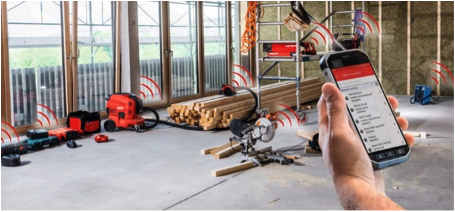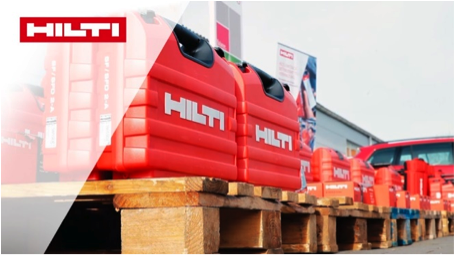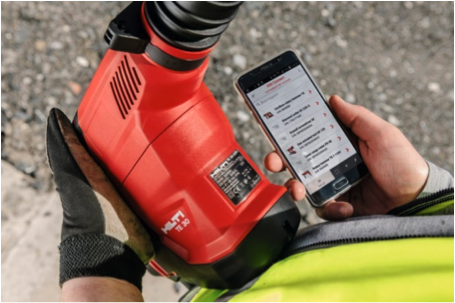Fleet management at Hilti – A case study on digital business model transformation and the role of IP
Kleenex is synonymous with paper tissues, Aspirin with pain killers, Scotch with adhesive tape, and BIC with correction pens. In fact, these brands have lent their names to entire product categories, evoking direct associations with quality and functionality in their target groups’ minds. The Hilti brand has managed to become synonymous with professional and uncompromising rotary hammers, and Hilti tools have become a must-have among tradespeople. All over the globe, the red Hilti case with white lettering is the epitome of professionalism and longevity, and as a logical consequence, the signal color Hilti Red (Ral 3020) is a protected color mark. But this case study is not about isolated IP. It explains how Hilti managed to align its tremendously successful business model transformation with its IP management.
 Hilti’s business transformation is by all means groundbreaking for European companies from the mechanical and systems engineering sector. Until recently, the traditional way of bringing innovations to market was to gradually introduce improvements in small and reliable steps, and in close coordination with the customers. But the ever-increasing penetration of the industry with software is making tools increasingly intelligent and allows them to communicate with each other and with the cloud. These technical possibilities are leading to an evolution and revolution in terms of business models.
Hilti’s business transformation is by all means groundbreaking for European companies from the mechanical and systems engineering sector. Until recently, the traditional way of bringing innovations to market was to gradually introduce improvements in small and reliable steps, and in close coordination with the customers. But the ever-increasing penetration of the industry with software is making tools increasingly intelligent and allows them to communicate with each other and with the cloud. These technical possibilities are leading to an evolution and revolution in terms of business models.
Hilti’s step from being a seller of products to becoming a provider of complete B2B solutions goes beyond additional services and traditional after sales services or spare part provision: it’s called fleet management. The fleet management idea at Hilti is derived from the automotive industry and comes as a one-stop package. Customers, and especially economically-savvy business customers, appreciate a one-stop service which is tailored to their individual needs and optimizes their own productivity. In return, they are prepared to pay a significantly higher price.
 Hilti’s Fleet Management means that the company is no longer selling drills but holes. This business model aims at establishing a long-term maintenance system with leasing contracts, and to enable long-term, sustainable, and stable customer relationships. Having adopted a market-oriented IP culture and having adapted its IP management to its business model, the company now benefits from the protection of its business model through the use of IP.
Hilti’s Fleet Management means that the company is no longer selling drills but holes. This business model aims at establishing a long-term maintenance system with leasing contracts, and to enable long-term, sustainable, and stable customer relationships. Having adopted a market-oriented IP culture and having adapted its IP management to its business model, the company now benefits from the protection of its business model through the use of IP.
Fleet management at Hilti explained: How does it work?
Authors of the case study:
 Dr. Stefan Nöken
Dr. Stefan Nöken
Since the beginning of 2007, Dr. Stefan Nöken is member of the Executive Board at Hilti cooperation, Schaan, Liechtenstein. He is responsible for the Fastening & Protection business, Application, Corporate Logistics as well as Intellectual Property. Dr. Nöken studied mechanical engineering at the Technical University of Aachen, Germany. After graduation, he worked in different positions at the Fraunhofer Institute for Production Technology, Aachen, Germany and finished his PhD in mechanical engineering. He joined Hilti in 2000 as Head of Corporate Engineering. In 2004, he took over responsibility for Supply Chain Management with the global plants, procurement and global logistics.
 Dr. Oliver Söllner
Dr. Oliver Söllner
Since 2008, Dr. Oliver Söllner is responsible for the company wide Intellectual Property Management of the Hilti group, Schaan, Liechtenstein. He studied physics at the University of Constance. After his PhD, he worked in different positions in research and development at Airbus and Daimler and changed 1996 into the field of intellectual property. At MTU Aero Engines he developed and established a companywide IP Management. He is patent assessor and European Patent Attorney. Since 2009 he is member of the Commission for Intellectual Property at the Association of the Swiss mechanical and electrical engineering industries (SwissMEM). In 2017 he became a member of the Expert Group for IP within the Swiss Business Association (economiesuisse).
 Prof. Dr. Alexander Wurzer
Prof. Dr. Alexander Wurzer
Dr. Wurzer is Adjunct Professor for IP Management at the Center for International Intellectual Property Studies (Centre d’Etudes Internationales de la Propriété Industrielle, CEIPI) at the University of Strasbourg, where he has been Director of Studies for the Master’s degree in Intellectual Property Law and Management (MIPLM) since 2007. Prof. Dr. Wurzer is Director of the Steinbeis Transfer Institute for Intellectual Property Management at Steinbeis University Berlin. He is Managing Partner at WURZER & KOLLEGEN GmbH, a consulting firm specializing in strategic IP management. Prof. Dr. Wurzer is Chairman of DIN committees DIN 77006 for quality in IP management and DIN 77100 for patent valuation. He is a member of the Board of Directors of “Deutsches Institut für Erfindungswesen e.V.” (DIE), Spokesman of the Board of Trustees awarding the Diesel Medal, Fellow at the Alta Scuola Politecnica at Milan/Turin Polytechnic. He is also a jury member for the 2018 German Innovation Award of the German Design Council and a member of the group of experts of the European Commission.



